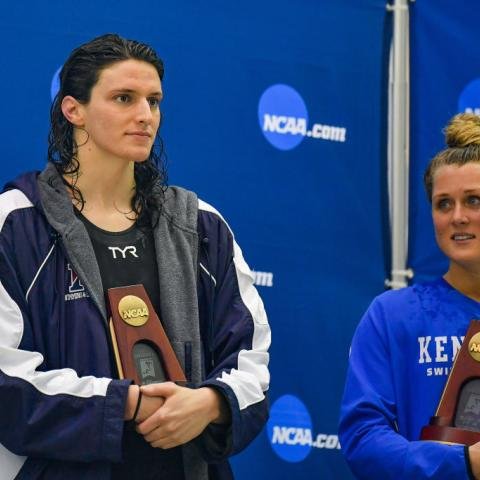
The Supreme Court left unresolved whether states can give primacy to biological sex over gender identity, a question that has divided lower courts nationwide, in its blockbuster decision upholding Tennessee’s ban on medicalized gender transitions for youth, though individual justices in the majority promoted their own conclusions in concurrences.
The most powerful nine jurists in America will consider whether to fill in the gaps from U.S. v. Skrmetti this week when, for the third time, they review petitions by West Virginia and Idaho to overrule courts that struck down their “fairness in women’s sports” laws that prevent males from participating in opposite-sex school sports.
The red states filed supplemental briefs ahead of Thursday’s judicial conference urging the high court to hear oral arguments rather than “grant, vacate and remand” the cases to lower courts to apply the new Tennessee precedent, which they said would prolong the split among at least eight federal appeals courts and put schools in some jurisdictions at legal risk.
Their co-counsel at the Alliance Defending Freedom speculated SCOTUS “may have been holding” the red states’ petitions until it ruled on Tennessee’s ban on so-called gender-affirming care for minors, which ADF defended alongside the Volunteer State at the high court.
Agreeing to hear the cases rather than send them back would be a timely boon for advocates of sex-based athletic participation, with Monday’s 53rd anniversary of Title IX.
Riley Gaines, who lost her NCAA women’s swimming trophy to male transgender swimmer Lia Thomas, just partnered with XX-XY Athletics on a clothing line to mark the anniversary of the 1972 civil rights law that ushered in an explosion of girls’ sports and is now the rallying cry of advocates for female-only competition.
Jabbing girls to compete in their own sports
“In recent months both the federal government and the NCAA have announced policies excluding male athletes from female competitions,” Idaho’s brief notes, referring to President Trump’s February executive order “Keeping Men Out of Women’s Sports” and NCAA’s transgender participation policy update to align with Trump’s order.
Because the 4th U.S. Circuit Court of Appeals blocked the West Virginia law, states and public universities in its jurisdiction are stuck between “a rock and a hard place,” the West Virginia brief says: They can’t follow NCAA policy without losing in court and they risk losing federal funding if they abide by the 4th Circuit and let males compete on girls’ teams.
Remanding creates a known “dilemma,” the Mountain State argued, noting the district court rebuffed a request by the Harrison County Board of Education to explain how it can reconcile Trump’s order with the judge’s injunction.
“Federal courts should not be constitutionalizing ‘circulating testosterone’ as the gauge for assigning athletic teams,” the Idaho brief says, referring to the 9th Circuit’s mandate that “athletic teams be divided based on circulating testosterone levels” – one of many factors that give males athletic advantages over females – rather than sex.
“If states hope to preserve some semblance of a level playing field for women and girls, they must do it by subjecting those women and girls to intrusive blood draws,” Idaho said.
“This case presents the equal-protection question” with a male college athlete, Lindsay Hecox, “and that [West Virginia] case presents the Title IX issue” with a K-12 male athlete before puberty, Becky Pepper-Jackson, the Gem State said.
“The cases are currently on the exact same track and ready to be resolved together this next Term,” just as SCOTUS granted two petitions to address equal-protection and Title VI racial discrimination claims in the Harvard-University of North Carolina consolidated affirmative action case that functionally ended racial admissions preferences, according to Idaho.
If SCOTUS remands both, “they may not come back before the Court again at the same time or in similar postures, preventing the Court from addressing at once all the relevant legal issues in all the relevant educational settings” and permanently foreclosing “medals, podium spots, and opportunities to compete in their own sports” for some females, the brief said.
“Girls deserve a safe, fair playing field today– not years from now –and the [4th Circuit] ruling’s present harm to women and girls is stark,” West Virginia said.
Defining sex as subjective ‘fundamentally changes the equal-protection analysis’
By ruling that Tennessee’s law did not make “sex-based classifications” in prohibiting puberty blockers, cross-sex hormones and surgery only as treatment for minors with gender confusion, SCOTUS ducked the central issue in the Idaho and West Virginia cases, the briefs say.
The majority provided no guidance to lower courts at odds with each other on whether female-only participation inherently classifies based on gender identity, as the 4th and 9th Circuits say, or does not, as the 11th Circuit said and the 2nd and D.C. Circuits “appear to agree,” West Virginia said.
The Richmond, Va.-based 4th Circuit then “followed its own precedent” – shared with the 7th, 8th and 9th Circuits – and deemed transgender individuals “a quasi-suspect class,” contrary to the holdings of the 10th and 11th Circuits, the brief said. It noted Tennessee concurrences by Justices Samuel Alito and Amy Coney Barrett raising this issue.
The 6th Circuit also rejected the quasi-suspect class finding, the Idaho brief says. (The two states don’t always refer to the same precedents by circuit.)
Defining sex as a subjective category, as the courts that ruled for transgender students have done, “fundamentally changes the equal-protection analysis” by saying gender-confused males are “similarly situated” to females, Idaho said.
It noted the 4th Circuit gave credence to Pepper-Jackson’s claim that gender-confused males “possess no inherent, biologically-based competitive advantages” over females without gender confusion “when participating in sports.”
Unlike the Tennessee case, “the parties agree that Idaho’s Save Women’s Sports Act classifies based on sex,” which the 9th Circuit called a “pretext to exclude transgender women from women’s athletics,” Idaho’s brief said.
Both states argue the circuit split between most of the nation’s federal appeals courts won’t go away even if the 4th and 9th circuits change their minds, “needlessly wasting valuable lower-court and party resources on remand” if SCOTUS doesn’t hear them now.




